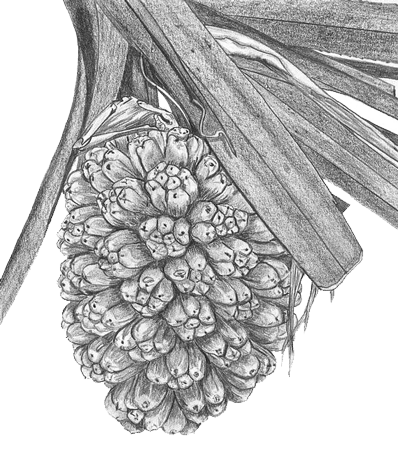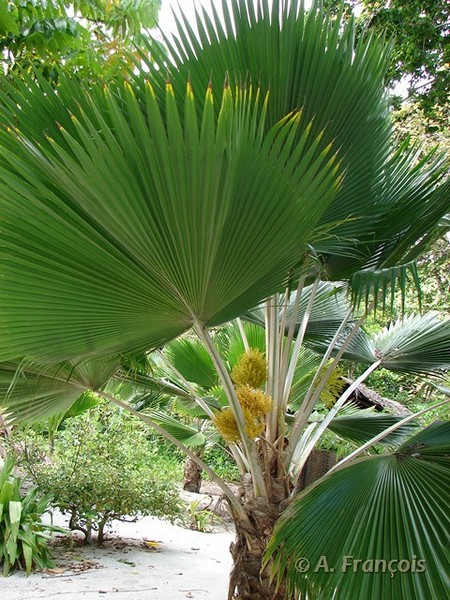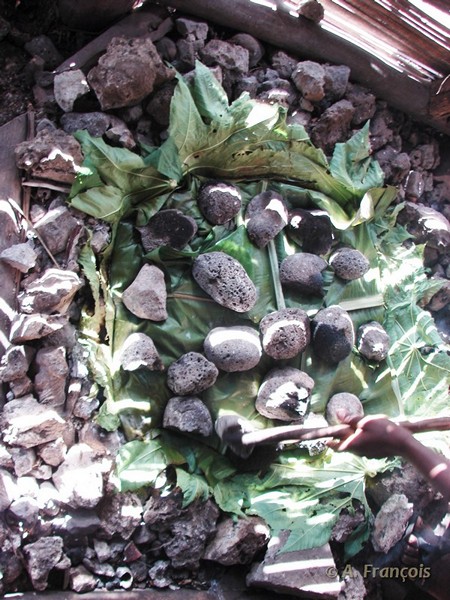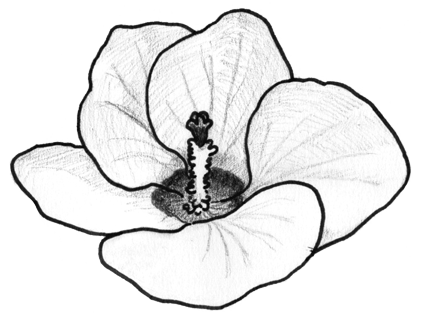Averb, transitive
1 – +locationgo as far as ‹specific location›, reach
| U-katau anoko u-vene u-le amjaka, u-vagasi pongo gilita.Follow the path upwards a little bit, and you'll reach the top of the hill. |
Bsecond verb, intransitive
1 – after motion vbgo and reach ‹somewhere›; hence all the way to ‹a place›
| Li-koioi li-su buluko ka li-koie li-vagasi takoie.They lit torchlights and led them in, until they reached (the village) inland. |
| Ero i-pu i-abu i-vagasi revo.The river flows down to the sea. |
| Waiero i-vene ne kulumoe i-vagasi uña moe.The waves went up on dry land, reaching the houses. |
vagumia faᵑgumia noun, relational
POc*kumichin, beard
Anatomy
beard
| U-di vagumia eo ko!Shave your beard! |
bake ‹food›, cook in the stone oven (awene)
| Li-vai uobake yams |
| Le-vai vioe ne awene.We bake taro in the stone oven. |
| Komoudo, va li-vai kokoro me peini melevele.Clam shells are commonly dried in the fire, and preserved in case of a famine. |
carry ‹burden› on o.'s shoulder using a stick
| Pi-valangia nganae aipa ponu?What are you guys carrying (on your sticks)? |
see lexical list at~labu
Grammar
1 – clause-initial positiongnomic aspect, in definitions or generic statements
| Dapa tadoe va li-somol' idi, ka li-e idi.Spirits are dangerous, they are cannibals. |
Grammar
2 – clause-initial positionHabitual aspect, in past or present contexts
| Va li-tabulu dapa ne ole.children playingThey roll in the sand. |
| Vana li-atevo eo.They keep talking about you. |
| Noma vana uña toñaki van li-ka li-punuo ñe idi li-lui.In the olden days, ships used to come and kidnap people to carry them away. |
vangana faŋana noun
glow, light
| vangana bulukothe glow of the lamp |
| vangana aevesun light |
| vangana kanimorolight of the stars |
Aadjective
2 – plantwild, growing in the bush (opp. cultivated)
| vongoro vaowild almonds |
| matamulue vao wild variety of matamulue plant |
Averb, intransitive
used absolutelygive birth, deliver a baby
| Ka i-ve?birth expectedHas she given birth already? |
Bverb, transitive
1 – female animal, womanlay ‹egg›, give birth to ‹offspring›
| Kulevelu ponu i-ovei pe i-ve waluluo ini moro abia na.This hen is able to lay eggs every day. |
| Ne metele tilu-tae kape i-ve menu.She will give birth in August. |
2 – man, womanbeget ‹s.o.›, be parent of
| Da ka lai-ve menu?Do they already have a child? |
| Mwaliko pe emele da mwalik’ iape lai-ve enga ini Amo Lupo.The boy who was born to that couple [lit. whom the woman and her man begat] was named Amo Lupo. |
| Emele iote i-ve ini, ka emele iote i-ve ene, da tieli.The woman who gave birth to him, and the one who gave birth to me, they were sisters. |
vebe feᵐbe noun
| li-ta vebesplit a ‘cutnut’ |
| Dapa pe li-anu kava, li-e vebe ñe ponu, me kape ije dapa memia etapu.Kava drinkers eat cutnut right after it, to take away the bitter taste. |
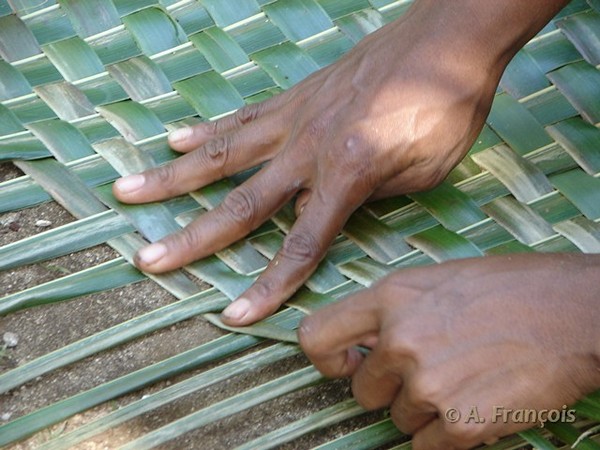
POc*patuRtie, plait, weave (mats, baskets +)
weave ‹s.th.›, plait
| li-vei beteweave a mat |
| Li-vei (uie) kie / (uie) woubo.weave pandanus leaves |
| Dapa noma, li-ovei pe li-loko uie woubo pe le-vei bavede peini.People before used to weave sails out of pandanus leaves. |
wild
| Ebele piene uo tae, na none veiko.This is not actual yam, this is a wild variety of Potato-yam. |
vekai fekai noun
Food
k.o. pudding made of taros (jebute) and almonds (vongoro), always presented in a long shape, and served on long Heliconia leaves (lukilo vekai) during public celebrations
| Li-apilo vekai wamtaka, biouro iape nga ne!They made small puddings, but still they were as long as this! |
seemama ②
velebie feleᵐbie noun
POc*Rabiastarch
Food
edible starch
| velebie peini maniokacassava starch |
| Velebie peini otovo, peini melevele pine.Sago starch is good in case of a major famine. |
crooked
| Poi ponu, ije ka i-ke biouro ka i-velei i-vene.This pig has had its teeth grow long, and bend upwards. |
antonymsusuko
Averb, intransitive
1 – go up, rise
| Aeve ka i-vene.The sun has risen in the sky. |
| Matiki Moro ka i-vene.The morning star had risen (in the sky). |
4 – geocentric coordinatesgo upwindtravel east or south
| Kape ne-ven' ne-le ne kulumoe.I'll travel east [lit. up] to the island (Vanikoro). |
antonym~abu ② ⓐ▻③
Bsecond verb, intransitive
1 – after intransitive verb(move+) up, upwards
| U-katau anoko u-vene u-le amjaka, u-vagasi pongo gilita.Follow the path upwards a little bit, and you'll reach the top of the hill. |
| Ka li-kopu li-vene li-le.They decided to move (camp) uphill. |
| Jebute i-karau i-vene awoiu, i-tuku ini i-abu.When your taro has finished growing up, it will bend itself down. |
| Poi ponu, ije ka i-ke biouro ka i-velei i-vene.This pig has had its teeth grow long, and bend upwards. |
| Apali i-maili i-ven' i-ka.The child grew up. |
~venei (i·)venei verb, transitive
~vene ‘go up’
vesepiene fesepiene noun
seed of speechword
| Piene adapa Teanu, ia vesepiene pe noma.This is Teanu language, but with some archaic words. |
| Vesepiene iune, i-vete ngatene tilu.polysemyIt is the same word, but with two distinct meanings. |
vesevelae fesefelae noun
Cf. vese
| Dapa Iura li-la vesevelae li-iu me viko.People in Vanuatu thread cone shells into shellmoney. |
synonymaero we anive
~vesu (i·)vesu
Averb, transitive
Cf. (?) ~vene ‘go up’
1 – erect, put up, stand up ‹s.th.› vertically
| Li-vesu wolowoloerect a cross |
| Li-vesu moe.erect a house |
| Li-nabe na ini wako, li-vesu iuro.Once we've marked the site (of the house), we stand up the pillars. |
1 – +object NP or direct speechutter, say, declare ‹s.th.›
| Uk' one tilu, kape ne-vete enga da metae.My in-laws, I can't say their names out loud. |
| Pi’ one i-vete tae.My grandfather never told me. |
Some speech verbs ✧ ~vete
| ~vete | say, mention |
| ~vete piene | talk, speak |
| ~mo | talk, speak |
| ~atevo | tell s.th. |
| ~viñi | tell s.o. |
| ~wasi | show s.o. |
| ~waivo | teach s.o. |
| ~kila | call |
| ~kilase | address s.o. |
| ~ko ② ⓐ | say, think |
| ~vodo | think |
2 – mention ‹s.o., s.th.›, talk about
| Na tepakola pe li-vete na?Is this the giant whom people keep talking about? |
| Iote pe eo a-vete ponu, i-wene ne moe 'none.The one you were mentioning is in my home. |
1 – say wordstalk, speak, communicate
| Li-vet' piene ñe ma dapa.They talk with their hands. |
| Ini i-vete piene wako se idi abia.She talks easily to everybody. |
synonym~mo
| Ini i-ovei pe i-vete piene ñe piene adapa Teanu.He can speak Teanu. |
| Li-vete piene ñi i-aiae, ia li-lengi wako.They speak (that language) with difficulty, but they understand it well. |
4 – grouptalk together, discuss
| La-vet' piene lai-ovili.They've been talking for too long. |
| Awis pine pe li-wapio kiapa li-vet' piene.Thank you for having gathered together to talk. |
synonym~votei
veve feve noun
Flora
1 – naturalvine, liana; bark of hibiscus with the elongated shape of a vine
| li-katei vevepull a vine (in the bush) |
| Li-la tero li-dai ñe uie luro.They take a liana and wrap it with coconut leaves. |
~vi1 (i·)vi verb, transitive
1 – wind, s.o.blow gently onto ‹s.th., s.o.›
| Ngiro i-vi idi.The wind is blowing gently on us (like a breeze). |
2 – henceattach ‹a prohibition, embodied by a taboo-leaf nuduro ②▻②› (to s.th., ñe) in order to reserve it for oneself
| Dapa li-vi nuduro se oie buioe me adapa ñoko.They tied a taboo-leaf to the areca tree, to reserve the nuts for themselves. |
~vi nuduro verb-object idiom
attach a taboo-leafperform a ritual of engagement (to a girl: se) for oneself, or for o.'s son
| Mwatagete iote ka i-vi nuduro se.She's already engaged to someone. [lit. A boy has already put up a taboo on her] |
synonym~nabe▻④
synonym~teli mama
Techniques
handle ‹of tool›
| Okoro pon, via i-mamakoe.That knife has a broken handle. |
| Ka i-wene peini u-totoñe via kome, via wele, tekumete, nga pon.The stingray sander (bele voro) can be used for sanding axe handles, paddles, wooden dishes, and so on. |
Hair ✧ viabasa
| viavia | body hair |
| viabasa | headhair |
| moloe ① | red, blond |
| bworobworo | dark |
| kiñe viabasa | long head hair |
| ero ③ | long falling hair |
| pwelele | soft |
| ome | frizzy |
| ~buibu | curly |
| ~bubu | braid |
Anatomy
headhair
| Ini i-bubu viabasa.She braids her hair. |
| Viabasa emele damala ponu pwelele.That white woman has soft hair. |
| Dapa li-loko mana vilo i-vio ne viabasa dapa.People put flowers in their hair. |
| Viabasa idi bworo, bworobworo ñoko tae, i-ovei pe moloe.Melanesian people’s hair is not always black, it can also be blond. |
1 – s.o.kick, touch ‹s.th.› with o.'s feet; step on ‹s.th.›
| Temabete me mawene, li-garei pe daviñevi li-viane.Women are forbidden from stepping on mats or semi-mats. |
2 – esps.o.hit ‹s.th.› with o.'s feet noisily or violently: trample, stomp
| Li-viane tepapa me aña ini.They jump on the (dancing) boards for the sound it makes. |
3 – s.o.stumble upon ‹s.th.› with o.'s feet; hence slip, fall
| Netebe pon, nara u-viane!This is mud here, make sure you don't stumble! |
synonym~tabau
5 – figfood plantsbe so plentiful as to trip ‹their owner› up in their garden. Proverbial saying, referring to s.o.'s economic prosperity
| Utele i-vian' eo?proverbialAre you so prosperous? [lit. do roots trip you up?] |
| A-viñi dapa a-ko le-ka pe i-vian' eo?ellipticalYou invited them (for a meal): is it because you are rich? [lit. because it trips you up] |
📘 The grammatical subject, usually utele ‘root, plant’, is sometimes omitted.
7 – figevent+reach ‹a certain moment›; last ‹a certain time›
| I-viane bwogo tili.(the festival) reached the fifth day. |
see~pu ~sali
8 – event+become suddenly known to ‹s.o.›, with some emotional impact; hence affect, disturb, move, catch by surprise
| Buro i-viane dapa ka li-le.[a song hit them as they went] As they walked, they were suddenly moved by a (beautiful) song. |
| Awa ene i-viaene imaluo iape.I like her character. |
| Awa ene i-viaene tamwase!I absolutely love it! |
derivativeawa ~viane
viapwene fiapʷene noun
Redup. via ①
2 – plumage
| Viavia ini ukiliro.Its plumage is quite colourful. |
| Dapa Niteni li-ejau viko ñe viavia mamdeuko.The people of Santa Cruz make money using feathers of the Myzomela bird. |
vijele fiᶮɟele noun
container for a liquid: bottle, jerrycan
| U-wabe vijele enone ñe kerosin.Fill up my jerrycan with kerosene. |
Viji fiᶮɟi placename
Geo
Fiji
| Kava ponu, ña kape le-vodo li-ko bwara pe li-la Viji, o Vanuatu.As for kava, you shouldn't believe that it came to us from Fiji or Vanuatu. |
Anthropology
1 – money, of the customary kind: in Vanikoro shell money, made of cowrie shells
| Dapa Niteni li-ejau viko ñe viavia mamdeuko.The people of Santa Cruz make money using feathers of the Myzomela bird. |
| Dapa noma Banie na li-ejau viko ñe mata aero – aero we anive.Our ancestors here in Vanikoro used to create money using shells, cone shells. |
| Ka ponu li-la viko, li-lui li-lateli ne moe ma tadoe.They took the ritual money, and deposited it in the gods’ lair. |
Traditional shell money ✧ Viko pe noma
Li-loko aero we anive, li-si kangele i-ke mina. Li-la voko waboro li-ia aero ñei wablubu, ka li-ejau viko ñei.
You collect cone shells, cut out the mollusc from it. Then using black stone, you file those shells into a round shape. That's how you made traditional money.
Modernity
2 – money, of the modern kind; coins, treasure
| Ni-romo viko i-aiae teve ene.Money is an issue for me. |
| Viko i-nene.The treasure was shining. |
~vili2 (i·)vili verb, transitive
POc*piritwist
squeeze, press ‹s.th.›
| U-la manave awoiu u-vili.kavaYou take a piece of coconut fibre, and squeeze (the kava). |
| Li-wete kava awoiu ka li-vili; kape le-wabe le-mini dapa po li-anu kava ne Toplau.After grinding the kava, they squeezed it; so they filled up [a bowl] and gave it to the kava drinkers in the men's house. |
vilisa filisa noun, relational
1svilisa ene2svilisa eo
vilitoe filitoe noun
Flora
k.o. grass (unidentified) with white flowers, which dancers commonly stick onto their hair as an ornament
| Vilitoe, ini abo mana koro.'Filitoe' is a kind of grass with white flowers. |
Plants and trees ✧ vilo
| vilo | plant, tree, wood, stick |
| wowo ① | top ‹of tree› |
| oie | trunk, bole ‹of tree› |
| utele | base ‹of tree›, roots |
| kara | root |
| ela ① | branch |
| mengela | stick |
| mana | flower |
| delesa | stem |
| uie | leaf |
| vese | seed |
| wa ① | fruit |
| bele | bark |
| ~do ① ; ~teli | plant ‹tree+› |
| ~karau | ‹tree› grow |
| ~toe | cut, chop ‹tree› |
| ~bo ② | carve ‹wood› |
Flora
1 – genplant: generic name for all plants, when a particular species name is not specified
| vilo peini melevele ‘famine food’ |
2 – esptree
| Vilo iote pine i-sabu ne anoko.There's a large tree felled on the road. |
| bele vilo tree bark → tapa |
3 – wood
| Puro, li-bo vilo korone.To make an arrow, you sharpen a piece of strong wood. |
| Li-bi vilo li-la ñe amuko.They carved some wood and applied seaweed varnish to it. |
4 – piece of wood, stick
| Li-dai ñe vilo li-asai botongo.We wrap it around a stick and tie it with a stitch [lit. stitch cover]. |
| Li-ia iawo ñe vilo.We light fire with (pieces of) wood. |
synonymmengela
1 – walk
| Ka i-vilu i-le.toddlerHe can walk already. |
| Kape ne-vilu ne-le ne basa re.I'll be walking towards that mountain over there. |
| Temaka ponu tamwaliko, u-vilu ene bwogo etapu!Those places are dangerous, don't walk around there at night! |
Wandering around ✧ li-vilu ngapwae
| ~vilu | walk; travel, wander |
| ~le | go |
| ~ka | come |
| ~tatale | walk |
| ~moloe ② | walk around |
| ~kotu | run |
| ~ava | fly |
| ~wowo ② | swim |
| ~wai ① | paddle |
| ~vesu bavede | sail |
| ~pwalau | travel by sea |
2 – genmove, wander, travel
| kanimoro pe i-vilushooting star |
| Kape le-vilu ñe kuo, le-to, we le-vesu bavede ñi nga ponu.They can travel on a canoe, whether by poling around, or sailing. |
| Pe nanana ka li-vilu ne toñaki ie damala.Nowadays, people travel on Western-style ships. |
| U-viñi etapu!Don't tell her! |
| Ne-ko ne-viñ’ eo ñe piene motoro.I'd like to tell you about an important issue. |
| Awa ene motoro ñe piene pe a-viñ’ ene.I give a lot of consideration to your words. [lt. the words you tell me] |
Averb, intransitive
1 – s.o.stand, be standing somewhere
| Kula pe li-vio ne teviri li-ioi; ka kula i-vio i-katei ne teviumu.dragging a canoe on landThose who are standing by the stern, they will push; the others stand at the prow, and pull. |
2 – s.th.be positioned somewhere, espec. in an upright position
| Bavede i-vio ne menuko.The sail stands on the prow. |
| Aero iupa i-vio vitoko na.Our (pig) pen is very close [from here]. |
| Li-akawo tabuluburi ne adie idi, puro i-vio ene.You hang a quiver on your shoulder, with arrows [standing] inside. |
3 – s.o., s.th.stand firmly, be stable or steady
| U-vio beiuko na u-tabau!in a treeStand firmly, don't fall down! |
| Ka li-wabeiu ñe moboro teva, me blateno i-vio, susuko, ne to.They used four rattan canes as props, so the pole would stand firmly in the middle. |
| Kanamuko me komudo i-vio korone ne tepungo.Clamshells sit [lit. stand] firmly in the coral rock. |
4 – s.th.stick out
| Ini mamote emele mwatebe; ero ka i-vio.indication of a woman's ageShe was still a virgin, but her breasts were already sticking out. |
5 – s.th.exist
~vio teve verb, oblique transitive
stand withbelong to ‹s.o.›. Forms possessive predicates equivalent to Eng. ‘have’
| Uña ngaten' na, kape i-vio tev' eo.All those things will be yours. |
| A-rom, na vilo engaiote! Vilo pon i-vio teve kiapa tae.Look at this strange plant! We don't have it in our island. |
synonym~wene teve
Bsecond verb, intransitive
1 – manner serialization(be, move) in a standing position
| Longe i-ka i-vio ne mwoe.The firewood was piling up [lit. came standing] in the house. |
2 – resultative serialization(move s.th.+) so it stands upright; hence erect ‹s.th.›
| Li-vesu blateno i-vio. Blateno pon, moboro pe li-ngago ñei i-vio teva.They erected the ritual pole. Four rattan rods were tied to it so it would stand upright. |
| Li-tabe longe li-kamai li-wapio i-vio ne moe.They brought the firewood back home and piled it up in the house. |
3 – (take, move s.th.) so it ends up being located somewhere; hence put up ‹s.th.›
| Dapa li-loko mana vilo i-vio ne viabasa dapa.People put flowers in their hair. |
| Gi' one i-la nuduro i-vio ne sekele.My uncle put up a taboo sign in his garden. |
| Puro, li-bo vilo korone, li-ejau i-vio ne viapwene.To make an arrow, you sharpen a piece of strong wood, and insert it [lit. make it ‘stand’] into a reed shaft. |
| Ne-wasu ngaten' enaka i-vio.I'll tidy up my stuff. |
POc*piRaqAlocasia macrorrhiza
| Pe na vioe tae, jebute.This is not hill taro, this is ordinary taro. |
see lexical list atavtebe
viro2 firo noun
analogy of shape w. viro ① (?)
coral reef; fringing reef
| U-da viro awoiu, u-le ne motono ngamuli.As you go across the reef, you reach the open ocean. |
Cf. aele ‘leg’
Anatomy
knee
| Men' one i-tabau i-woi visibaele ini ne touro.My son fell down and hurt his knee on the reef. |
visone fisone noun
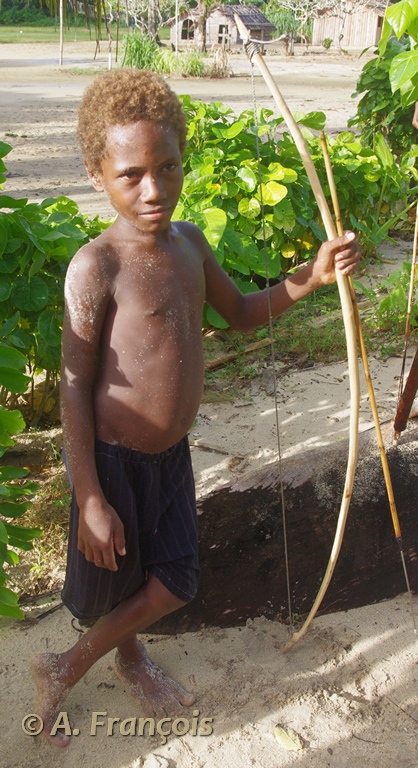
POc*pusuR
| Sekele iaba ene vitoko ne, takoie ne.Our garden is here, uphill this way. |
| I-wene pwo v'to teve awene tae? – Tae, n-ro tae!Isn't it on the ground, close to the fire? – No, I can't see it! |
| Paiu vitoko i-ka.directional verb ~ka ③ ⓑPaiou village is very close from here. |
| Vivilo li-teli ne netebe.Swamp taros are planted in swamps. |
see lexical list atavtebe
~vo1 (i·)vo verb, transitive
1 – pound, beat ‹s.th.›, esp. with long and heavy stick
| Dapa noma li-vo kangele kome li-ia kome.People in the past used to smash giant clams and grind them into axes. |
see~wete
~vo2 (i·)vo verb, transitive
(?) ~vo ①
~vo3 (i·)vo verb, transitive
1 – raretie ‹s.th.›, fasten with rope
| Kape li-odo tenuro me le-vo ñe nengele kuo korone.We'll look for a rope so we can attach firmly the elements of the canoe. |
| Ni-vodo ni-ko eo ka uña damiliko iono pi-te wako.I hope that you and your children are well. |
| Ni-vodo ni-ko nga u-samame ene.I was hoping you would be able to help me. |
synonym~ko bwara
3 – sometremember ‹s.o., s.th.›
| Mamote a-vodo?Do you still remember? |
| O io, ka ni-tabo ni-vodo!Oh yes, I remember now! |
antonym~mui
voko foko noun
POc*patu
stone, of any size: boulder, rock, pebble
| maga voko pebbles |
| Waiero li-bo voko i-wapio.The waves have piled up the stones together. |
| Ni-tabulu voko i-abu i-le ne gilita.I rolled a rock down into the valley. |
2 – tear, break ‹leaf, stem›; hence pick ‹fruit, plant›
| Mwalik' iote i-ka i-vokoiu nuduro.Someone came and tore out the taboo leaf. |
3 – crush ‹s.th.›, destroy, kill ‹s.o.›
| Ka i-le i-le po ngiro i-aka ponu ra ka i-vokoiu. I-vokoiu wolowolo pon, i-vokoiu ka i-tabau.The hurricane blew so hard that it destroyed it. It destroyed the cross, and brought it down. |
| Kape le-ka kape ne-labu iote ne dapa ne-vokoiu!I'll come take one of them and I'll crush him! |
Geo
Vono or Lovono: a village on the north coast of Banie, together with its area
| Kula ka i-ka se vono Lale, Ngama, Vono.Some people (from Paiu) had moved to the areas of Lale, Ngama and Vono. |
📘 This village is also known, in the literature, under the names Vanou or Whanou (Dillon). Its local name, in the language Lovono, is Vana.
synonymLovono
POc*panua
1 – dry land (opp. sea); hence coast
| Waiero i-vene ne vono i-katau ngiro Palapu.The waves went up to the dry land, following the north wind Palapu. |
| waiero peini vono [wave of the coast] tidal wave |
2 – rarearea, zone
| La-kovi vono basakulumoe aplaka Teanu.on the oceanThey sailed past the zone of the small island Teanu. |
3 – +placenamedistrict, limited area around a certain village
4 – rarethe world, universe
| ne lovia vono iotein the Other World |
📘 Neither vono or lovia vono are used as the normal word to designate the present world.
seemarama
Vonovono fonofono placename
Redup. vono ②▻③
Geo
the Reef islands, north of Temotu province
| piene adapa Vonovonothe Äiwoo language |
POc*paŋan
1 – s.o.eat, have a meal
| Li-atevo iepiene pe noma, li-oburo, li-vongo ka li-mokoiu.We tell old stories, we sing, we eat and then we go to sleep. |
2 – s.th.be burning, burn; perish in fire
| Moe enone i-vongo ne iawo.My house perished in the fire. |
| Kuo enone i-vongo.My canoe was burnt! |
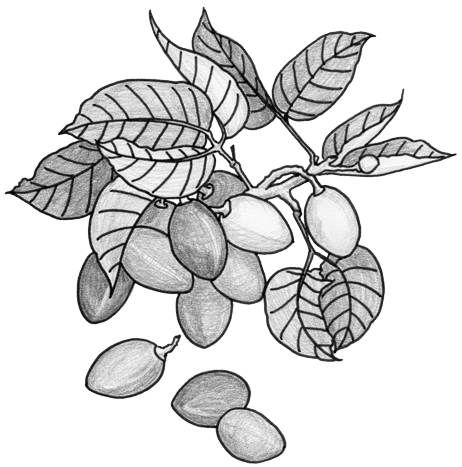
POc*[ka]ŋaRi
| vongoro vaowild almonds |
| iunubo vongorobasketful of almonds |
| Li-wete jebute li-wete vongoro awoiu pon, li-ejau mama.We mash taros, we crush almonds, and make the mama pudding. |
~votei (i·)votei verb, intransitive
discuss, deliberate; instruct, give instructions
~votei piene verb-object idiom
instruct speechhold a meeting
| Moe nga ne, moe pe li-votei piene.This sort of house is used for meetings. |
synonym~wapio ⓑ
